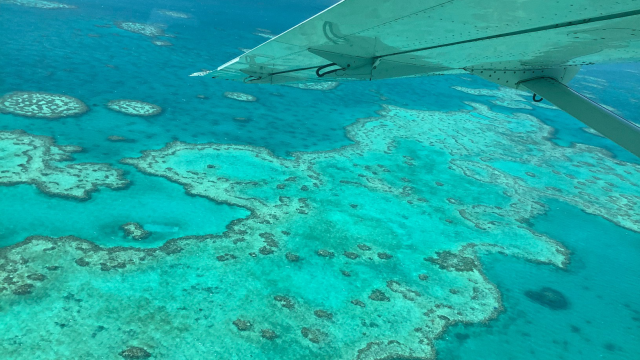The Great Barrier Reef is under threat by hot waters that have everything to do with our failure to take climate action.
The ARC Centre of Excellence for Coral Reef Studies at Australia’s James Cook University published its findings Tuesday outlining a mass bleaching event taking place off the coast of Australia. Bleaching occurs when the water is too hot, pushing out the symbiotic algae that help corals feed and give them their colour. That’s why corals turn white during these events.
Though not always the case, bleaching can kill corals. And the Great Barrier Reef has already seen its share of coral mortality. This mass bleaching event, however, seems worse than recent ones and is the third bleaching event on the reef in five years, marking a disturbing trend.
“That is just a harrowing statistic and, of course, one that helps us remember the acute threat that global reefs are under every single year,” Kim Cobb, a coral researcher at Georgia Tech, told Earther. “But the Great Barrier Reef seems to be taking these repeated hits. It’s horrific to see.”
In the last two weeks of March, the researchers conducted aerial surveys of 1,036 coral reefs to measure how widespread the bleaching was. Their surveys revealed that the northern, central, and southern sections of the reef are dealing with bleaching. In 2016, the northern part suffered the most. In 2017, the it was the central. This time, it’s the whole damn thing, including the previously spared the southern region of the Great Barrier Reef.
“The issue with that is that when you have pockets of reefs that remain healthy through these events, you obviously stand a better chance at broader-scale resilience because you have a healthy adjoining reef to this larger system,” Cobb said. “That was a ray of bright light in the 2016 and 2017 bleaching events”¨. This time, of course, that has been wiped out”¨.”
February saw the highest temperatures ever recorded in the waters around the reef. Heat extremes like this can stress the corals to the point of death, but the team won’t know until they get into the water later this year and assess the damage.
Unfortunately, oceans waters will only grow warmer. Marine heatwaves have become more common and stronger in recent decades as carbon pollution heats up the whole planet. Corals aren’t the only species that suffer. So do crustaceans and sharks.
And then there’s people. We rely on marine ecosystems for tourism and fisheries, among other things. Even the biomedical industry is looking for a cure for cancer in reefs. We might not all live a boat ride away from a reef, but we’re all impacted when they suffer.
Losing the Great Barrier Reef would amount to a $92 billion loss for Australia. Beyond dollar signs, however, this death of corals would leave a World Heritage Site-sized hole in the world. Terry Hughes, director of the ARC Centre, tweeted a couple weeks ago during the surveys that seeing the Great Barrier Reef suffer is like being “an art lover wandering through the Louvre… as it burns to the ground.”
The only way to save this masterpiece is through a drastic reduction in greenhouse gas emissions.
